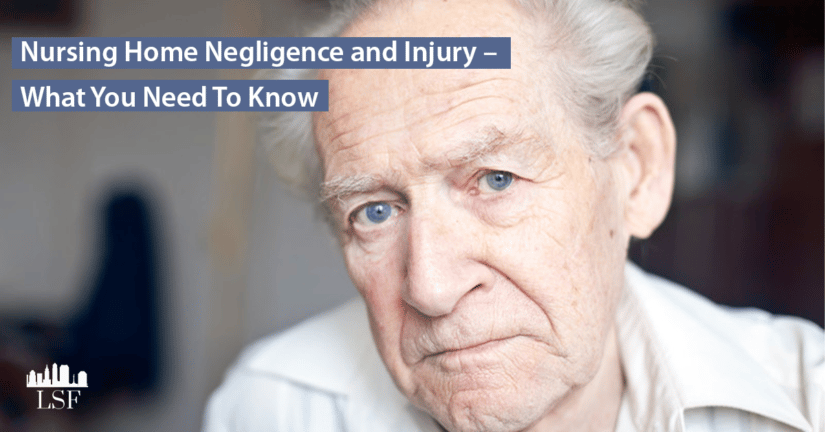Nursing Home Negligence and Injury – What You Need To Know

Nursing home negligence is one of the most common forms of abuse and neglect perpetrated against adults 65 years of age and older. It’s important to spot it before it becomes a life-threatening problem and to take the necessary steps to ensure your loved one is removed from a dangerous situation if you believe negligence or abuse has already occurred.
So what is nursing home negligence? Negligence is the failure to take reasonable care to avoid causing injury to another person. Nursing home negligence involves the failure of a facility or its staff to provide reasonable and adequate care for its resident. This includes a range of actions (or lack of actions) that result in harm done to a senior in that facility’s care and can include:
Lack of supervision and adequate staffing: Many residents require a higher level of supervision due to the physical and mental conditions that prevent them from living independently at home. The nursing home is required to provide each resident with enough staff to adequately supervise and meet their needs. Lack of adequate supervision and understaffing at nursing homes can result in falls, choking incidents, and even elopement.
Inappropriate nursing or medical care: Residents of nursing homes are entitled to proper nursing and medical care and administration of their prescribed medication. If your loved one’s medical needs are not being met or if they are not receiving the medication they require in the proper dosage, it can cause major health setbacks and even death. Lack of proper care can result in death or injuries from falls, pressure ulcers, and medication errors.
Lack of basic safety and nutrition: Aging adults in assisted living and nursing home facilities have a right to safe, clean facilities, clean water, proper food and nutrition, access to bathrooms, clean bedding, and comfort. If a resident has specific food restrictions or dietary compliances, those guidelines must be followed to protect the resident from choking and from malnutrition and dehydration. Good nutrition is also vital to healthy skin for residents with decreased mobility.
Poor hygiene: This can include both personal hygiene and the overall cleanliness of the facility itself. Proper care for nursing home residents includes regular bathing, brushing of hair and teeth, and laundering of sheets and clothing and must include appropriate upkeep of the facility as well. Poor hygiene can contribute to complications with bed sores and pressure ulcers, which can become infected and cause further illness or death if untreated. Your loved one’s nursing home must be regularly cleaned, disinfected and decluttered to avoid tripping hazards. Cleanliness issues can also be an indicator of understaffing at the facility.
Social and emotional abuse: Nursing homes and assisted living facilities are obligated to provide social and emotional support for their residents. A resident who is left alone too often, verbally abused, ignored or otherwise neglected can suffer major emotional and physical consequences.
Physical or sexual assault: Bodily harm, whether from physical or sexual abuse, is never acceptable. Often, the victims of physical and sexual abuse in nursing home negligence cases are individuals diagnosed with dementia, Alzheimer’s or other cognitive disorders. Any incident of physical or sexual assault should be reported to police immediately.
If you suspect a loved one may be experiencing neglect or abuse while living in an assisted living or nursing home facility, be on the lookout for the following signs:
- Unexplained injuries or infections
- Bed sores, pressure ulcers, and other skin issues
- Panic attacks, fear of caregivers, or other emotional and psychological issues
- Malnutrition or dehydration
- Poor hygiene and general uncleanliness of facility
- Loss of weight due to inadequate nutrition
- Choking
- Constant fatigue, irritability, hair loss, and papery skin
- Loss of mobility or independence
- Falls
Most importantly, if your loved one tells you that an issue has arisen, believe them and follow up consistently. Contact local law enforcement if your loved one is in immediate danger of harm and remove them as soon as possible from the facility in question.
In most cases, a local ombudsman for long-term care can be called in as an advocate. It is their job to point you to specific resources such as adult protective services and social services providers who may need to get involved. The Ohio Department of Health is also available to receive and investigate complaints of nursing home violations.’
Finally, if you believe your loved one may have been a victim of nursing home negligence, contact an experienced nursing home injury or negligence lawyer to help protect your loved one’s legal rights as soon as possible. Acting fast ensures that your loved one’s case has the best chance at a thorough investigation and information gathering from all parties involved. Though a settlement or lawsuit can’t undo the past, it can ensure that the future of your loved one’s care is in far, far better hands.
Contact Lowe Scott Fisher Co. LPA to learn more about how we may be able to help.
Back To Blog